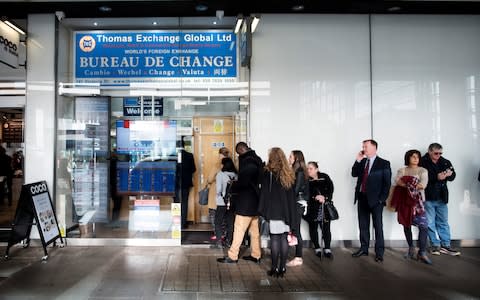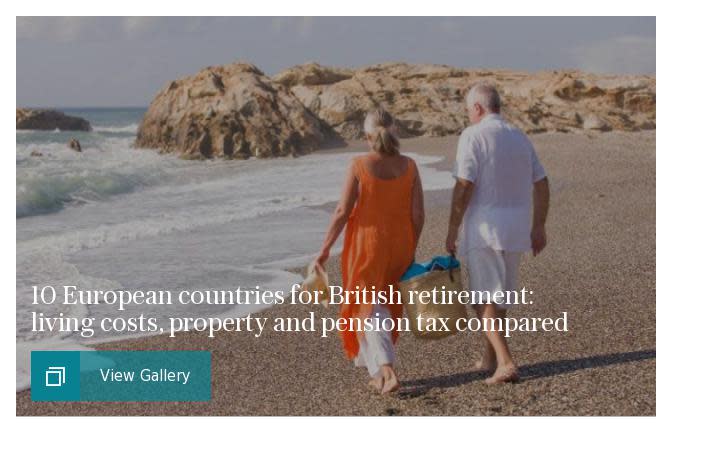Travel money: holidaymakers offered less than €0.90 per £1 - here's how to get more

Fears over Brexit have sent the pound tumbling to an eight-year low giving holidaymakers the worst currency rates since the financial crisis.
Yesterday currency exchange kiosks were reported to have been offering less than €0.9 for every £1. Those buying travel money before boarding their flights were getting as little as €0.87 for £1 in some airports.
But airports are notoriously poor value particularly at times of currency volatility. This is because the kiosks build in a large margin for holding physical cash.
There are a number of ways to get far better rates.
For example, Travelex is currently offering the best rate of €1.06. For £500 you can get €531 and delivery is free, if you order in advance.
If you're not travelling for a while but want to hedge your bets to ensure you don't get caught out if the rate moves significantly against you, you can use buy back guarantees and other tricks. You can read about how to do this here.
If you are happy to take a gamble then you can also wait and see what happens, accepting that no one can say with any confidence what is coming next.
Local bureaux, ordering in advance and ordering via post
For cash, small local outlets tend to offer the best rates in areas where competition is fierce, such as central London and other major cities.
The consumer website MoneySavingExpert has an online tool called TravelMoneyMax that sifts through the rates offered by online bureaus, taking your location into account.
Unlike larger rivals, there is often no discrepancy in the rate for cash ordered online or picked up in person. It is worth checking to see how convenient it will be to pick up your cash, as there may be queues at popular locations.
Those who don’t live in a highly competitive area can still boost the rate they get by ordering in advance from a larger bureau.
Most bureaus offer preferential rates if you pre-order or print out a voucher to secure the online rate, rather than walking through the door.
In a test conducted by Telegraph Money last year, the difference between the in-store and pre-order rate at one bureau, International Currency Exchange (ICE), was significant. For a £2,000 exchange into euros the preferential rate would have got you an extra €58.40.

Some currency firms will offer to post cash to you if you order online; you can expect to pay £5 for orders under £500. Order more and your delivery is usually free.
If you use a credit card to purchase the cash then you will be protected under Section 75 of the Consumer Credit Act if something goes wrong. If you use a debit card you may be protected under the Chargeback scheme.
Prepaid cards
Prepaid cards for spending abroad come in a variety of forms - it can take time for a card to arrive, so this may not be an option for those who want to buy their cash today.
Some let you top up the card in the desired currency, locking in the rate received, while others you load in pounds and convert the money as you spend.
Make sure you know what exchange rate the card will use, and any associated fees. Some may charge to withdraw cash for instance.
Money loaded onto a prepaid card is safe as long as the provider is regulated, as they then have to keep your money in a ring-fenced account. If the company goes bust, your money is protected.
Be wary of using some of these cards in the UK, where there may be steep fees.
There are some things you should avoid using a pre-paid card for: security deposits, automated petrol stations and car hire. This is because these can lead to funds being “held” on your card, making them inaccessible.
You can use another card for the security deposit, then your currency card when you actually have to make a payment.
Here are some examples of cards that can be used around the world - there are also specific dollar and euro cards available, if you only need one of those currencies.
Revolut
Revolut’s pre-paid Mastercard works through an app, and offers the exact interbank exchange rate for 120 different currencies - far better than any currency bureau.
At the weekends when markets are closed, it charges a small premium on top of the Friday closing exchange rate.
There are no fees to spend, and no fees to withdraw up to £200 in cash a month, but a 2pc fee above that. You’ll have to pay £5 for the card to be delivered.
You can hold pounds, euros and dollars simultaneously on the card, and exchange between them. If you’re in a country using another currency, your money will be exchanged as you spend.

The app lets you know exactly how much each transaction is costing you in pounds, and provides a breakdown of your spending. There are also optional security features, such as an automatic block on the card if the location it is being used at doesn’t match your phone's GPS location.
Caxton Mastercard
Unlike Revolut, Caxton’s card lets you lock in an exchange rate for a large range of currencies.
You can load it with a choice of 14 currencies, including euros, Australian dollars and Japanese Yen - multiple currencies can be held at the same time.
There is no charge for withdrawing cash or spending abroad, and you can log into an online account or mobile app to check your balance.
Caxton charges a 2.49pc exchange rate mark-up, but unlike many cards there is no fee for taking out cash abroad.
At present it offers a rate of $1.25, compared to the spot rate of $1.28.
FairFX Everywhere
FairFX’s card is a simple one, with no app or multiple currencies to worry about.
You load it in pounds, and your funds are converted as you spend, wherever you are.
FairFX charges a low 1.4pc exchange rate mark up on top of the Mastercard rate, spending is free, and there’s a £1 ATM withdrawal fee.
Others
Other cards to consider include those from Moneycorp, WeSwap, ICE and the Post Office.
When deciding on a card, you should compare the foreign exchange fee, fees to spend, and fees to withdraw cash, as well as which currencies are available.
Credit cards
Specialist travel credit cards offer another option if you don’t want to carry cash, or are planning to spend a large amount. Again, a card will take time to arrive.
You get the added bonus of Section 75 protection too, meaning if something goes wrong with a purchase the card provider is jointly liable.
Make sure you set up a direct debit to clear the bill in full each month, or else interest charges will wipe out any benefits.
There are a large number to choose from, but one standout is Halifax’s Clarity Mastercard.
There’s no fee on spending or withdrawing cash, and Mastercard’s set exchange rate is typically higher than that of an American Express or Visa card.
If you open an account before September 3 this year, you’ll get £20 cashback on your first transaction too.
Creation’s Everyday card is another competitive option.
Don’t try to use any old credit card - as it is likely to be a costly experience.
One trap to watch out for with credit cards is that if you withdraw cash, even if you clear the bill in full and there is no withdrawal fee, you may still be charged the interest on the amount withdrawn until the balance is cleared.
Barclaycard’s Platinum Travel card is an exception to this - you won’t pay any interest on cash withdrawals if the balance is cleared in full at the end of each month.
Debit cards might cost you
In general, debit cards are more expensive than credit cards to use overseas. There are charges for ATM withdrawals, plus some charge up to £1.50 for each purchase.
Some of the worst offenders include Halifax, which charges £1.50 per purchase, and Santander which charges £1.25 per purchase.
Metro Bank offers a fee-free card, but only within Europe. Outside of Europe it charges a 2.5pc transaction fee and a £1.50 ATM withdrawal fee.
If you want to pick up at the airport...
However, decent rates can be found if you order currency in advance for collection at the airport.
In our test, two branches at Gatwick’s South Terminal offered competitive rates – ICE Gatwick and Moneycorp. To secure those rates, ICE required buyers to print out a voucher from its website, while Moneycorp required orders to be made online at least the day before.
It is vital to adhere to the rules of the outlet you choose - failure to do so will lead to paying a much worse on-the-day rate.

Why you should always pay in local currency
If you are spending or withdrawing cash abroad using any type of card, and you are offered the choice of conducting the transaction in pounds or in the local currency, pick the local currency.
If you choose pounds, the retailer you are buying from does the conversion, which could be less than favourable and negates the advantage of having a top card in the first place.
If you choose the local currency, your card provider will handle the conversion.
How to guarantee the rate you get
If you are concerned about future exchange rate movements and want to guarantee you get the best rate possible, you can make use of buy back guarantees and cancellation rights to “hedge” against the pound getting stronger or weaker.
Read more about how this works here
If you are moving money abroad, get bank-beating exchange rates and your first transfer free with The Telegraph International Money Transfer Service

 Yahoo Finance
Yahoo Finance 